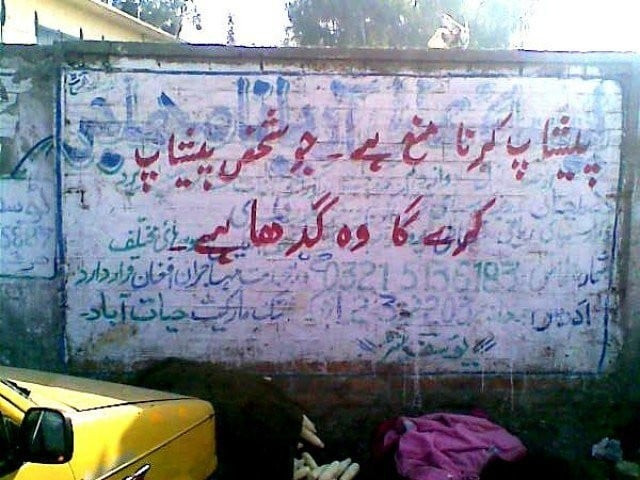Where to go when you need to go
Karachi lacks public toilets in most public places while the world observes "World Toilet Day"

PHOTO: FILE
"There is no public toilet at this bus stand. I am travelling with my family. A man can compromise if nature calls. But what about female passengers?" said a retired professor, who was waiting for his bus. "They have only one toilet for staff, which is also locked. Where should we go?" he lamented.
The world observes "World Toilet Day" today [Monday] in order to tackle global sanitation crises, but unfortunately it is has been the least of priorities for our successive governments.
The World Bank's latest report, 'When water becomes a hazard' revealed that the management of drains and treatment of human waste is nonexistent for most rural dwellers in Pakistan and that poor conditions also prevail in small towns and cities. There has been almost no effort by the public sector to regulate the presence of sanitation facilities or monitor water quality. As a result, there is a huge variation in the quality of latrines built.
Judicial commission forms committee to regularise water supply in DHA
"More than 82% of households are not connected to any drainage system and generate stagnant pools of sewage near dwelling areas in villages," states the report, referring to Sindh. "Even where drains exist, majority are open drains with no treatment of effluents. Under such conditions, untreated fecal waste water seeps into ground water aquifers or drains into surface water, polluting both," it adds. According to the report, "fecal sludge also contaminates the soil. Virtually no investment has been made in the management of fecal sludge or waste water."
Deplorable conditions
Karachi, a metropolitan city and the economic hub of the country, lacks public toilets in most public places. Where public toilets do exist, often women and disabled persons are deprived of the facility. An example can be taken from Jinnah Post Graduate Medical Centre (JPMC), one of the largest public hospitals of Pakistan, which is also lacking in this facility. "Only two public toilets exist in the hospital and one remains closed after 5pm," said an official who works at the hospital. "Hundreds of people visit the hospital every day. The condition of the majority of toilets in hospital wards is pathetic. The patients and attendants have no other option, but to use overflowing toilets," he added.
These days, public toilets near Lucky Star in Saddar remain closed due to shortage of water. "I don't use their toilets, but it has been closed for the last two days. There is shortage of water," said a man who runs a shop in front of the public toilets. "The government has built and handed them over to a third party. They charge Rs10 per visit but despite taking money, the toilets are not sanitary," he added.
Although the World Bank in its report said that the situation in urban areas of Pakistan is better, things are far from adequate. "Overall, urban Punjab and urban Sindh have greater access to covered underground drains as compared to Khyber Pakhtunkhwa and Balochistan," reads the report. "In urban Punjab, 59% of households had access to underground or covered drains, 35% used open drains, and 5% had no access to drains. In urban Sindh, 68% of households were connected to underground or covered drains, 28% used open drains, and 4% had no access to drains," states the report.
According to Nadeem Ahmed, a water and sanitation expert, various countries are now making an effort to improve the situation, but Pakistan still has a long way to go when it comes to sanitation.
"Drinking water, health and the food chain is attached with sanitation. Sindh relies mostly on flush toilets connected to open drains and pit latrines," he said. "The distance of the household's water source from the toilet becomes an important factor in determining source contamination. Most people drain human waste in agricultural land. So nothing is hygienic," said Ahmed.
Gujranwala's waste problem brings government priorities into question
Efforts under way
The Strengthening Participatory Organisation (SPO) with the help of WaterAid Pakistan has started a campaign to mobilise lawmakers on water, sanitation and hygiene.
SPO Regional Coordinator Raheema Panhwar, told The Express Tribune that safe sanitation is a basic human right and is central to eradicating extreme poverty. "Pakistan is among the world's 36 most water stressed counties in the world. Two out of every five schools are missing a toilet." said Panhwar. "Around 23% of households have a garbage collection system in Pakistan. You can get a sense about the importance of sanitation in our country from this," she added.
Panhwar added that 25 million people in Pakistan defecate in the open, making Pakistan the 9th in the top ten countries in the world in this regard. "Around 88% of diarrhoeal disease in Pakistan is attributed to unsafe water supply, inadequate sanitation and poor hygiene. 79m people in Pakistan lack decent sanitation and about 92% of the wastewater is untreated and goes directly to water bodies," she said.
There is however, some good news in the making. The Sindh government has developed a 10-year multi-sectorial 'Sindh Strategic Sector Plan 2016-2026 Drinking water, Sanitation and Hygiene' to provide better sanitation services in province. In this regard, the provincial government has notified 'Sindh Sanitation Policy 2017' that aims for 100% eradication of open defecation in the Sindh province, and people will have access to use sanitary latrines by 2025. "The sanitation policy is meant to develop a 'Neat and Clean Sindh'," said the Excise, Taxation and Parliamentary Affairs Minister Mukesh Kumar Chawla. He said that the government has allocated around Rs21 billion in the provincial Annual Development Plan (ADP) and Rs5b in the district scheme to revamp water and sanitation issues.
Published in The Express Tribune, November 19th, 2018.



















COMMENTS
Comments are moderated and generally will be posted if they are on-topic and not abusive.
For more information, please see our Comments FAQ